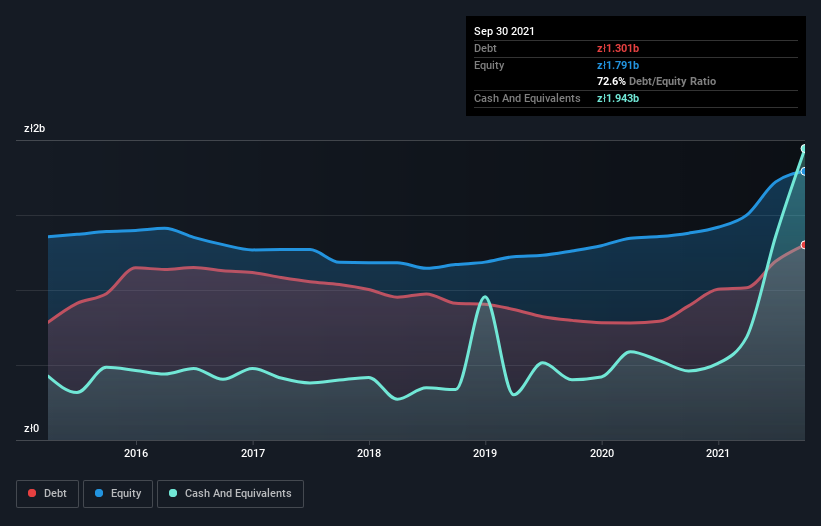Howard Marks put it nicely when he said that, rather than worrying about share price volatility, 'The possibility of permanent loss is the risk I worry about... and every practical investor I know worries about.' So it seems the smart money knows that debt - which is usually involved in bankruptcies - is a very important factor, when you assess how risky a company is. As with many other companies Polenergia S.A. (WSE:PEP) makes use of debt. But should shareholders be worried about its use of debt?
Why Does Debt Bring Risk?
Debt is a tool to help businesses grow, but if a business is incapable of paying off its lenders, then it exists at their mercy. Ultimately, if the company can't fulfill its legal obligations to repay debt, shareholders could walk away with nothing. While that is not too common, we often do see indebted companies permanently diluting shareholders because lenders force them to raise capital at a distressed price. By replacing dilution, though, debt can be an extremely good tool for businesses that need capital to invest in growth at high rates of return. The first step when considering a company's debt levels is to consider its cash and debt together.
View our latest analysis for Polenergia
How Much Debt Does Polenergia Carry?
You can click the graphic below for the historical numbers, but it shows that as of September 2021 Polenergia had zł1.30b of debt, an increase on zł894.0m, over one year. However, its balance sheet shows it holds zł1.94b in cash, so it actually has zł642.4m net cash.

How Strong Is Polenergia's Balance Sheet?
Zooming in on the latest balance sheet data, we can see that Polenergia had liabilities of zł1.85b due within 12 months and liabilities of zł1.60b due beyond that. On the other hand, it had cash of zł1.94b and zł502.9m worth of receivables due within a year. So it has liabilities totalling zł1.01b more than its cash and near-term receivables, combined.
While this might seem like a lot, it is not so bad since Polenergia has a market capitalization of zł3.01b, and so it could probably strengthen its balance sheet by raising capital if it needed to. However, it is still worthwhile taking a close look at its ability to pay off debt. Despite its noteworthy liabilities, Polenergia boasts net cash, so it's fair to say it does not have a heavy debt load!
Also positive, Polenergia grew its EBIT by 29% in the last year, and that should make it easier to pay down debt, going forward. When analysing debt levels, the balance sheet is the obvious place to start. But it is future earnings, more than anything, that will determine Polenergia's ability to maintain a healthy balance sheet going forward. So if you're focused on the future you can check out this free report showing analyst profit forecasts.
But our final consideration is also important, because a company cannot pay debt with paper profits; it needs cold hard cash. Polenergia may have net cash on the balance sheet, but it is still interesting to look at how well the business converts its earnings before interest and tax (EBIT) to free cash flow, because that will influence both its need for, and its capacity to manage debt. Considering the last three years, Polenergia actually recorded a cash outflow, overall. Debt is usually more expensive, and almost always more risky in the hands of a company with negative free cash flow. Shareholders ought to hope for an improvement.
Summing up
While Polenergia does have more liabilities than liquid assets, it also has net cash of zł642.4m. And we liked the look of last year's 29% year-on-year EBIT growth. So we are not troubled with Polenergia's debt use. When analysing debt levels, the balance sheet is the obvious place to start. However, not all investment risk resides within the balance sheet - far from it. For instance, we've identified 3 warning signs for Polenergia (2 are concerning) you should be aware of.
At the end of the day, it's often better to focus on companies that are free from net debt. You can access our special list of such companies (all with a track record of profit growth). It's free.
New: Manage All Your Stock Portfolios in One Place
We've created the ultimate portfolio companion for stock investors, and it's free.
• Connect an unlimited number of Portfolios and see your total in one currency
• Be alerted to new Warning Signs or Risks via email or mobile
• Track the Fair Value of your stocks
Have feedback on this article? Concerned about the content? Get in touch with us directly. Alternatively, email editorial-team (at) simplywallst.com.
This article by Simply Wall St is general in nature. We provide commentary based on historical data and analyst forecasts only using an unbiased methodology and our articles are not intended to be financial advice. It does not constitute a recommendation to buy or sell any stock, and does not take account of your objectives, or your financial situation. We aim to bring you long-term focused analysis driven by fundamental data. Note that our analysis may not factor in the latest price-sensitive company announcements or qualitative material. Simply Wall St has no position in any stocks mentioned.
About WSE:PEP
Polenergia
Engages in the generation, distribution, trading, and sale of electricity in Poland and internationally.
Low risk with imperfect balance sheet.
Similar Companies
Market Insights
Community Narratives



